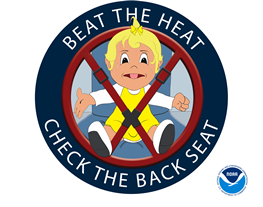Never Leave Children, Disabled Adults or Pets in Parked Vehicles

Risk for Children and Adults
The risk of a serious injury or death during hot weather is heightened for children left alone in vehicles. Hypothermia (heat-stroke) is the leading cause of non-crash vehicle deaths for children under the age of 14. Each year, approximately 37 children die from hypothermia.
- In 10 minutes, a car can heat up to 120 degrees F.
- Cracking a window does little to keep the car cool.
- With temperatures in the 60s, your car can heat up well above 110 degrees.
- A child’s body temperature can rise up to five times faster than an adult’s.
- Heatstroke can happen when the temperature is as low as 57 degrees outside.
Safety tips to prevent hypothermia
- Never leave a child unattended in a vehicle. Babies and young children are not able to regulate their body temperatures well — warming at a rate three to five times faster than an adult — especially in a car, where the windows create a greenhouse effect. In just half an hour, a car’s interior can get 35 degrees hotter.
- Do not let your children play in an unattended vehicle. Teach them that a vehicle is not a play area.
- Never leave infants or children in a parked vehicle, even if the windows are partially open or with the engine running and the air conditioning on.
- Make a habit of looking in the vehicle – front and back – before locking the door and walking away. When left unattended by an adult, thirty percent of children affected by hyperthermia gained entry into an unlocked vehicle, became trapped and were overcome by heat.
- If you are bringing your child to daycare and normally it’s your spouse or partner who brings them, have your spouse or partner call you to make sure everything went according to plan.
- Ask your childcare provider to call you if your child does not show up for childcare. Do things to remind yourself that a child is in the vehicle, such as:
- Writing yourself a note and putting the note where you will see it when you leave the vehicle;
- Placing your purse, briefcase or something else you need in the back seat so that you will have to check the back seat when you leave the vehicle; or
- Keeping an object in the car seat, such as a stuffed toy. When the child is buckled in, place the object where the driver will notice it when he or she is leaving the vehicle.
- Always lock vehicle doors and trunks and keep keys out of children’s reach. If a child is missing, check the vehicle first, including the trunk.
- If you see a child alone in a hot vehicle, call 9-1-1. If they are in distress due to heat, get them out as quickly as possible. Warning signs may include: red, hot, and moist or dry skin, no sweating, a strong rapid pulse or a slow weak pulse, nausea or acting strangely. Cool the child rapidly. Call 9-1-1 immediately.
Risk for Pets
Leaving pets locked in cars is never safe. But when the weather gets warmer, it can be deadly. Pets can’t withstand high temperatures—they can cause irreparable organ damage and even death.
How to help a pet left in a car:
- Take down the car’s make, model and license-plate number.
- If there are businesses nearby, notify their managers or security guards and ask them to make an announcement to find the car’s owner.
- If the owner can’t be found, call the non-emergency number of the local police or animal control and wait by the car for them to arrive.
Information on Heat-Related Car Safety was provided by the National Weather Service, (www.noaa.gov), National Highway Traffic Safety Administration, Safe Kids USA and the article Tragedy in the backseat: Hot-car deaths.
